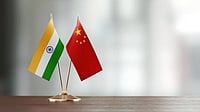
US imposes 50% tariffs on Indian imports under Trump’s executive order.
Bessent cites Modi-Trump ties while criticizing India’s Russian oil profiteering.
Navarro calls Ukraine conflict “Modi’s war,” linking it to discounted Russian oil.
Trade talks stalled as US presses India on tariffs and energy choices.
As the 50% US tariffs took effect on Indian imports from August 27, US Treasury Secretary Scott Bessent on Wednesday said that at the end of the day, “we (India and the US) will come together.” The White House official reiterated US President Donald Trump’s criticism of India’s “profiteering” from Russian oil purchases, even as he voiced optimism that New Delhi and Washington would eventually reach a trade agreement despite the imposition of steep tariffs.
Speaking to Fox Business Network, Bessent acknowledged the complexities in the relationship amid economic concerns but also highlighted the strong personal rapport between Prime Minister Narendra Modi and US President Donald Trump as a basis for progress.
He said, “This is a very complicated relationship. President Trump and Prime Minister Modi have very good relationships at that level. And it’s not just over the Russian oil.”
Criticism on Trade Talks with Delhi
Bessent has criticized New Delhi’s approach to the negotiations. Talking about the same, he remarked, “I think a lot of it by the Indians has been performative. But I will tell you, I’ve said this all along during the tariff negotiations: the US is the deficit country. When there is a schism in trade relations, the deficit country is at an advantage. It’s the surplus country that should worry. So the Indians are selling to us. They have very high tariffs. And we have a very large deficit with them.”
He also mentioned that India was among the first to have initiated talks after Trump’s April 2 “Liberation Day” announcement on tariffs. However, progress had been slower than expected. According to Bessent, “The Indians came in very early, after Liberation Day, to start negotiating on tariffs. And we still don’t have a deal. I thought that we would have a deal in May or June. I thought India could be one of the earlier deals. And they kind of tapped us along in terms of the negotiations and then there is also the aspect of the Russian crude purchases, which they’ve been profiteering on. There are many levels going on here.”
Despite the differences, he said that he believes a resolution would be reached. “At the end of the day, I think we will come together with India,” Bessent said.
Navarro Calls Ukraine Conflict ‘Modi’s War’
Meanwhile, White House trade adviser Peter Navarro called to the Ukraine conflict as "Modi's war," and criticized India for buying discounted Russian oil. In a conversation with Bloomberg TV, he argued that these purchases have enabled Moscow’s aggression and imposed costs on American taxpayers.
Navarro further stated that India could receive a 25% reduction in US tariffs if it stops buying Russian oil.
When asked if the U.S. is considering any tariff adjustments, Navarro said, "It's really easy. India can get 25% off tomorrow if it stops buying Russian oil and helped to feed the war machine." He also said, "I'm puzzled. Because Modi is a great leader. This is a matured democracy with matured people running it."
Additionally, talking about India’s position on trade, he said, "What's troubling to me is that the Indians are so arrogant about this. They say, 'Oh, we don't have higher tariffs. Oh, it's our sovereignty. We can buy oil from anyone we want.”
50% Tariffs on Indian Imports
On the other hand, the 50 per cent tariffs on imports from India to the United States came into effect on Wednesday. This came after the draft notice published by the U.S. Customs and Border Protection (CBP) stated that the order would come in effect from August 27.
The notice stated that the additional duties are being imposed to give effect to the President's Executive Order 14329 of August 6, 2025, titled "Addressing Threats to the United States by the Government of the Russian Federation." The order set a new rate of duty on Indian imports. The move follows the announcement by U.S. President Donald Trump to raise tariffs on Indian goods to 50 per cent.































